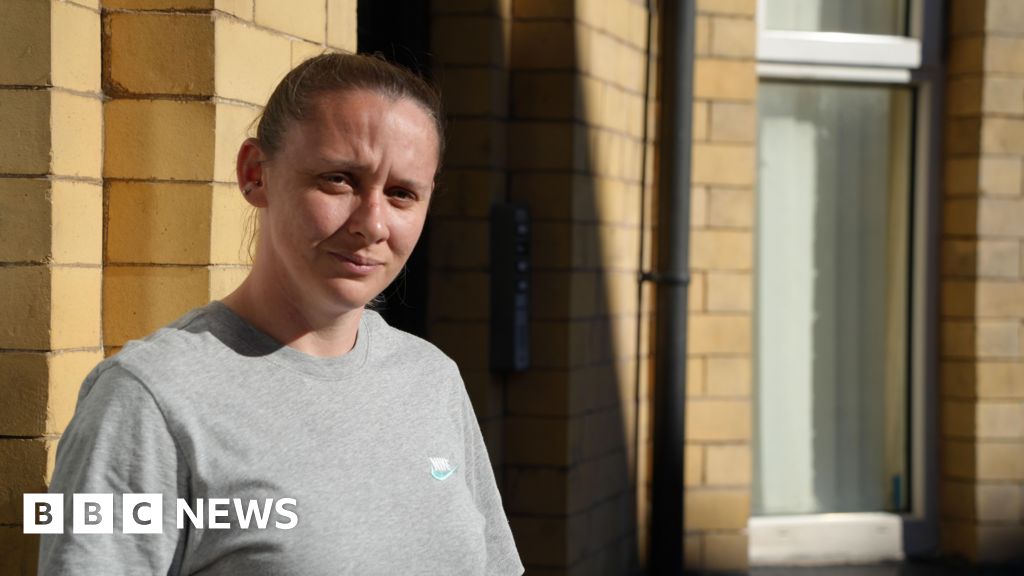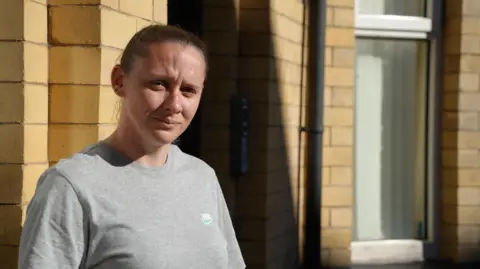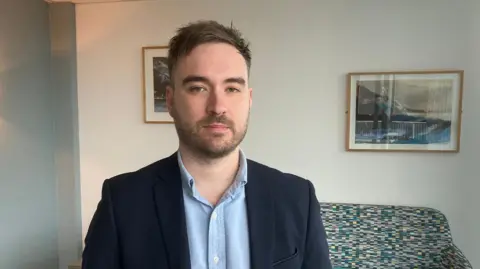Gambling: Addict spent wedding night betting couple’s money

 BBC
BBCA woman who spent her wedding night secretly losing half of the money she and her wife had been gifted has accused betting companies of “predatory” behaviour.
Elissa Hubbard, 38, spent what was meant to be the happiest day of her life in 2021 hidden away gambling as part of an addiction that – at its peak- cost her £40,000 a year.
It comes as BBC analysis suggests about one in five gambling premises are in Wales’ poorest areas. An expert in the psychology of gambling called clusters of betting shops in deprived areas “a huge problem”.
The Betting and Gaming Council (BGC) said all its members operated “robust self-exclusion schemes”.
Elissa first went on slot machines in a pub when she was nine but when she discovered online gambling, her addiction escalated.
She said, during the height of her addiction, the thought of getting free spins in a promotion may have been enough to see her bet her entire monthly wage.
“All my self-worth had gone,” she said.
“It had just stripped me of a personality. I just felt like such a failure.”
As she began to recover she started to “feel hatred” the way companies promote bets.
Elissa, who lives in Rhyl, Denbighshire, said gambling adverts were inescapable.
“If you want a bet you’re going to go and have a bet… You don’t need your dealer stood there handing you a promotion.”
After moving from her hometown of Manchester to the north Wales coast, Elissa said her flat was surrounded by betting shops, casinos and arcades – and worries how many appear in poorer areas.

BBC Wales’ analysis found there were 71 premises in the 10% most deprived areas compared to eight in the 10% least deprived.
“It’s people that are on a lower income that will try to gamble to make more money for themselves,” said Elissa.
“There’s just no need for how many there are in one area, because you could do a self-exclusion, but that won’t cover you for arcades or adult gaming centres.”
Elissa said she could not stop walking past bookmakers entirely but was careful to avoid even looking at fruit machines if she was out for lunch in a pub.
- If you’ve been affected by the issues in this story, help and support is available via BBC Action Line
Dr Jamie Torrance, a researcher in the psychology of gambling at Swansea University, said clusters of betting shops in deprived areas were “a huge problem”.
“Both financial hardship and being unemployed are significant risk factors for the development of disordered gambling,” he said.

He added that marketing strategies and adverts from gambling companies were “particularly enticing” for people suffering financial hardship.
“You never see people lose money in those adverts. You’ll never see people experiencing harm. All you’ll ever see is people winning, people being excited and happy.”
Dr Torrance said Wales “desperately” needed NHS clinics dedicated to treating disordered gambling, which already exist in England.
“There’s no real difference between a disordered gambler in Wales and England other than the fact that they don’t have access to these clinics,” he said.
Conservative Member of the Senedd Darren Millar, who sits on the Senedd’s gambling related harm group, accused bookmakers of “driving and fuelling” addiction.
“It’s a well-known fact that, unfortunately, poorer communities tend to have a bigger problem with gambling,” he said.
“Regrettably many people in the bookmaking industry take advantage of that by placing their bookmakers in community centres in deprived areas.
“That of course is completely unacceptable.”
The BGC said its members had donated “£122.5m over four years” to tackle gambling-related harms.
A spokesman said about 22.5 million people a month gambled in Britain and “the overwhelming majority do so safely and responsibly”.
“Betting and gaming operators, like any other retailer, locate in areas of high footfall such as high streets, and play an important role in the local economy,” the BGC added.
The Welsh government said it was committed to “strengthening support for people affected by gambling addiction” and was working with the NHS to develop treatment services.
It also said it fully supported “comprehensive reform of the industry to increase regulation, and strengthen protection from harm”.
You can watch Elissa’s story on Wales Live on BBC iPlayer
Related
I became a millionaire in my 20s but my sports…
Millions wagered, hundreds of thousands in debt and a pending divorce.Joe C, a native of Chicago, fell into the depths of addictive sports gambling at the age o
Strip executive retiring after 3 decades with gambling giant MGM…
A top executive who oversees multiple properties on the Strip, including one of Las Vegas Boulevard’s most recognizable and successful casino-hotels, is
Danish Government’s Success with Gambling Addiction
Gambling addiction is a growing concern worldwide, with many countries struggling to find effective ways to regulate the industry. Denmark, however, has e
UFC 313 Gambling Preview: Will Magomed Ankalaev end Alex Pereira’s…
Alex Pereira is back! On Saturday, Pereira puts his light heavyweight title on the line against Magomed Ankalaev in the main event of UFC 313. Before that, J













